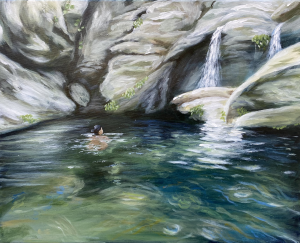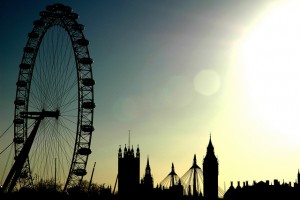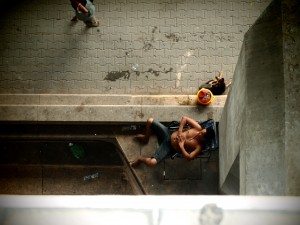Customary Crawls
by Olivia Boyle | February 3, 2024
“There’s a chill on the air.” It was November in the late nineties when Roger Deakin, literature graduate turned naturalist, explored the waters of London in Waterlog. Thermometer in hand, I spent this summer salvaging what I could from Deakin’s watery heyday. I donned the costume that hasn’t been touched since my last competition three years ago, packed a pen, notebook, three pastéis de nata, and a copy of the Tories’ terse tract on public health as I set off to swim the city.
Once upon a time, the Weimar-inspired outdoor swimming pools (public lidos) of London “represented a modernising trend towards a democratic concern for a freely available, healthy, convivial environment, putting pleasure and health firmly at the centre of civic life.” In 1999, Deakin swam at the newly reopened Brockwell Park Lido. With the tumble turn of the century, Weimar is history, and the lidos of London—Brockwell included—have eroded away with that modernist philosophy.
Deakin maintained the warm optimism of a belief in the future of public lidos. A quarter of a century on, I feel more bleak. The pool’s temperature never fell below 20°C this summer but, on frosty December mornings, the air is on par with the water as swimmers and lifeguards band together in the camaraderie of 3°C. And talk of the temperature is “of course, a swimmers’ version of the foundation of all civilised societies: talking about the weather.” Elements of Deakin’s patriotic age begin to seep through expressions like these—did weather talk die with the Queen or with Deakin?
There is a feisty community of regulars who have spent twenty years outraged by management shifts. In the ladies’ bathroom, conversations are fraught with the outrage of having only one functioning toilet out of the three on offer. Following a twenty-minute dip, the swimmers seek shared warmth in their fury at a once-glorious lido slipping into disrepair.
“It’s when Fusion Lifestyle took over that toilets stopped mattering,” says an older woman in the familiar, roguish scat of someone who has spent their life in Brixton. She swims here every morning and enjoys the lottery of the loos. But it’s a scatological farce. A condition of, as the woman loudly makes sure our frozen frames have all understood, a local authority’s turf—or perhaps turd—war with the Department for Culture, Media, and Sport (DCMS), the pocket of the government’s snug, dry overcoat which has conflated the meaning of ‘public’ with ‘unimportant’. At least “the South Londoners are enthusiastic cold-water swimmers.”
There’s a disjunction between the swimmers on land and in water, beyond the intrinsic difference that means swimmers just do better in water. Like, I’ve always put off going for a run. It misses the continual cooling from the kind, lapping waves that disguise my remarkable ability to go an unholy red when exerting myself on terra firma. It’s simply funny how swimmers relax in water. Still, this is a line toed by competition—chances of relaxation are scuppered by the capped bullet in the lane next to you who’s matching your pace a little too closely. Under the wellness guise, we are wrapped up in this, well, sad competition. Outside the pool, we are a fraternity, and in it, we’re foes.
Though it might be more forgiving to say we egg each other on in our cold plight. But one mustn’t be numb to the added luxury of art-deco heyday. Swimming at Brockwell Lido is gliding protectively streamlined alongside revolutionary modernism.
To shift backwards in time is to remember a May bank holiday when three friends and I were giddy with the liberty of a whole day free from adult intervention. We went to the outdoor pool nearest to our school, entranced by the technicolour fantasy of adulthood. Of course, it was only fantasy because we had nothing bad to say about the weather, which was still ever so slightly under-welcoming for the baring of behinds. But, as Deakin records, Tooting Bec Lido is less about the swimming and more about the people’s pool. He recalls:
John, the Irishman with all the jokes, says to his neighbour, ‘Try some of this; it’s an exfoliant. Smoothes your skin.’…While in the hottest corner at the end opposite the door, a tall Tunisian soaps himself repeatedly from head to foot, muttering incantations. Nobody can tell whether it’s religious or obsessive, and nobody minds.
I can’t help but be taken aback by Deakin’s dated perspective on nationhood. Tooting is one of the most diversely populated areas in London so for a reclusive, thoroughly English man to have assessed nationality in this way tiptoes around arrogance.
Tooting Bec was festive that Monday off. The four of us spent hours on end embodying the grace of a synchronised swimming team as we leapt and spun rhythmically into the deep end, unfazed by hypothermic prospects. Our grownup panache dictated that it was the right and proper thing to reward ourselves with some chips and ketchup: a snack to accompany the commute home. Now Tooting Bec is closed. Don Cheevers’ swimmer, supposedly paddling in Deakin’s mind, faces the same “growing dark and the moment when the pinheaded birds seem to organise their song into some acute and knowledgeable recognition of the storm’s approach.” Plagued by asbestos and underfunding, the community hub has been closed since December 2022 and will remain so for the foreseeable future.
Accompanied by our ketchup-drenched chips, we began the sullen trip home. Waterlogged and tired, hair wet and discouraged by the ever-tempestuous May weather, the post-swim withdrawal is demanding at any age. Deakin combatted this by “travelling as often as possible by bike, the natural complement to swimming.”
I, too, spent the summer cycling from pool to pool. All because TfL pricing is unaccommodating for the under 60s, I am in desperate need of ego inflation, and there is generally an encouraging amount of support for cyclists in the city.
I would make my way home in the Cheevers vein: “by an uncommon route giving him the feeling that he was a pilgrim, an explorer, a man with a destiny.” I anticipated the homeward bound hill that doubled up as hairdryer. My pilgrimages—from home to Lido—were on the bumpy roads of an Ultra Low Emission Zone (ULEZ) expansion scheme. I had to mount the pavement to avoid getting stuck in drying tarmac. These wild deviations from the paths I knew are ripples in the water of change as London adapts to its ecologically utopian vision. I might get to spend less on the tube ride to the North of the river for my swims in Hampstead and Soho if I can cycle all the way there without my ‘destiny’ being the underside of an HGV.
This summer, however, I braved the sweaty underground with the promise of a cooling dip at the surface. Eye-line love affairs were curtailed by red-hot faces and damp underarms. If only the tortoise-shell bespectacled traveller with an endearing taste for Beatnik poetry could have seen me streamlining through Brockwell’s classy water.
On the evening before my 19th birthday, I had been turned away from the Serpentine Lido in Hyde Park which has, let’s say, liberal opening times, and was in desperate need of a cool down. Deceptive mid-August clouds bring a great deal of stickiness in the built-up West End. The nearest saving grace was this Oasis, the rooftop lido in Soho. Park-dwelling Brockwell was replaced with some family of high-rises, watching the pool with the intent of kids watching commuters in a busy train carriage. The lido felt more out of place in the inner city than the Ladies’ Pond. An assault of leisured indulgence on the toiling cityscape.
At the Covent Garden Oasis Lido, you might have found Deakin pondering on poolside the cash-weighted “dense cotton-wool mist that rose off the surface, diffusing the lights and reflecting off the lifeguard’s glass kiosk.” Or why and how cushy-jobbed politicians have time for a lunchtime plunge while austerity thrives.
So, sweaty—there’s a theme here—I rushed into the leisure centre.
“I’ll swim, please. I’m a student too,” I assured the receptionist, to scrape back some of the expense blown on the Piccadilly tube from Knightsbridge to Covent Garden.
“You’re too late,” he said. “The pool closes in fifteen minutes.”
Despondent and clammy, speckled with tube soot, I received pity gladly. He said he’d smuggle me in for the remaining time free of charge. Result: I’ve never changed so quickly.
The pool was emptying in a way that suggested they all knew something I didn’t (like the timetable), but I enjoyed snaking around the pool in the way I used to. Before I took on competitive swimming, flipping, jumping, and sinking as far to the bottom as possible were the most important parts of pool-dwelling. One summer holiday, the lifeguard was, I think, frankly disturbed by the amount of time I had spent letting my fingers prune and piped up to my mum with the line: “She is a fish.” I guess I should be flattered.
I spent this swimming summer mostly unable to shake my competitive urge pushing me to pace relentlessly up and down. But the afternoon swim that shouldn’t have been was the most freeing yet. Gazing at the clouds surging psychedelically, teasing us with their secret evening blue, I clasped on to my bygone youth before turning another year older.
It’s a fond memory. I suspect that’s in part down to it being a free, more accessible dip. Swimming, competitively and leisurely, is pricey. My eager distance from it in the pandemic years came partly from the intolerable costs of the weekly swims, new costumes, and stiflingly hot competitions where only ten minutes of the five or six hours would be spent in the water. I don’t think I would have paid for a swim in the Oasis pool. It would have been a watered-down luxury that, in exclusive Soho, missed the trick of community.
Now in the winter months, London’s public lidos will empty save for the brave few who bear allegiance whatever the weather. Waters will still until the sun shines for long enough to welcome retired teachers, local florists and cafe owners, lifeguards who are just filling their summers, and ex-competitive swimmers simply looking to bathe. The public lido incites community spirit—it doesn’t get more intimate than hair meshing in drains—and locality in the hubbub of the cosmopolitan hustle.
I have rekindled some harmony with water by observing people entrust public pools to enrich their lives. By the end of the summer, my copy of Waterlog was sodden. Its pages dripping with chlorinated water, pondweed, and time travel. Though Deakin’s London has changed substantially since 1999, one thing remains timelessly clear: public lidos should be protected at all costs.∎
Words by Olivia Boyle. Art by Yasmin Beed.




